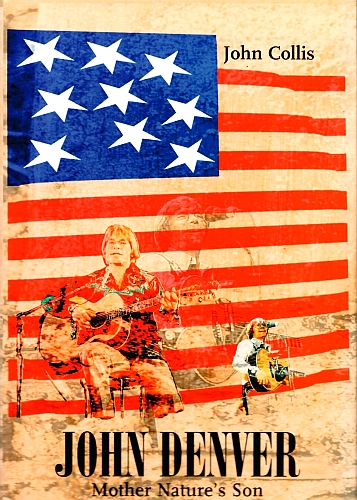

| JOHN DENVER Mother Nature's Son John Collis Edinburgh: Mainstream Publishing, 1999 |
Rating: 4.0 High |
|||
| ISBN-13 978-1-84018-124-1 | ||||
| ISBN-10 1-84018-124-9 | 190pp. | HC/FCI | £15.99 | |
Those familiar only with John Denver's popular songs may regard him as a simple soul — someone who gloried in the out-of-doors, who loved high mountains and sunshine on his shoulders, who was glad to be a country boy and to take life one day at a time. But his entire ouvre paints a more complicated picture; and beneath the surface of his songs there was a deep sorrow, as John Collis reveals in this memoir.
That John Denver was a superb entertainer, there is no doubt. He was blessed with a clear and powerful singing voice, and he had the knack of working an audience. These gifts made him one of the most popular performers during the 1970s and early 1980s. Collis, a fomer music editor with Time Out, tallies the rise of his various hits on the charts and the other headliners and backup performers he worked with: an impressive record.
But admiration was not universal. Numerous critical quotes from other music journalists attest to the existence of a faction that despised Denver's work for its lack of a driving beat and the absence of outrage or sarcasm. Reviewing the single of "Sunshine on my Shoulders," Melody Maker's Allen Jones provides the quintessential example:
"John Denver is one of those totally abysmal American singer-songwriters who seem to have been created with the sole intention of driving me into a psychotic rage. His wretched, weeping ballads drive me to murder, pillage and rape." – Page 106 |
Collis himself exhibits a dislike of Denver's sappier songs, including "Sunshine,", though he is never so immoderate as Jones. Writing of tributes left after Denver's untimely death by his fans, he compares those fans to a cult, a sort of "Denver Moonies."
"But this immediate impression is perhaps unworthy, since there is nothing whatsoever sinister in Denver's work — on the contrary, it is the goddamned wholesomeness that seems to be the uniting factor." – Page 169 |
John Denver rose to prominence in a turbulent time, the era of civil rights activism, Vietnam War protests, the Watts riots and Watergate, the assassinations of JFK and RFK and MLK, Jr. There was a place for outrage and sarcasm in songs, to be sure (and there still is.) But the ability to create with song a sense of camaraderie, to inspire with visions of nature and its champions like Jacques Cousteau are also of value. These abilities were strong in John Denver, and should not be disparaged.
In my opinion, Collis devotes too much time to the metrics of musical success, and too often digresses into a precis of another artist's appearance. Some of these are unknown to me.1 There are also a number of factual mistakes, detailed as usual in my Errata list.
But in the main this is a worthwhile examination of John Denver the man. It begins with his death in an aircraft accident on 12 October 1997, and it does not gloss over Denver's faults. He sometimes drank too much. Like many performers, he spent too much time on touring and too little on home life. As a result he lost two wives, which failures ate away at his soul. His idealism, expressed as a love of nature and a lifelong zeal to conserve it, set him apart from run-of-the-mill singing stars. At the same time, he had a yen for fads like EST which somewhat diluted his effectiveness. He was, in short, a human with his share of imperfections.
In the final analysis, John Denver was a force for good through his songs, his films, and his work for the causes he embraced. He had a powerful influence in his prime, and that influence continues, though it is diminished by time. For all his flaws, he had a "higher consciousness" in the sense that he understood the importance of living in harmony with nature — something many still do not understand. He was aware of his flaws; he knew that, in the words of Phil Ochs, "My life could never be as moral as my songs." Collis conveys these things very effectively in his book. He includes a discography2 and a list of sources, though he omits an index. Thus, though the book has substantial defects, I'll rate it a 4. It should probably be read along with Take Me Home, the autobiography by John Denver and ghost writer Arthur Tobier.

 To contact Chris Winter, send email to this address.
To contact Chris Winter, send email to this address.